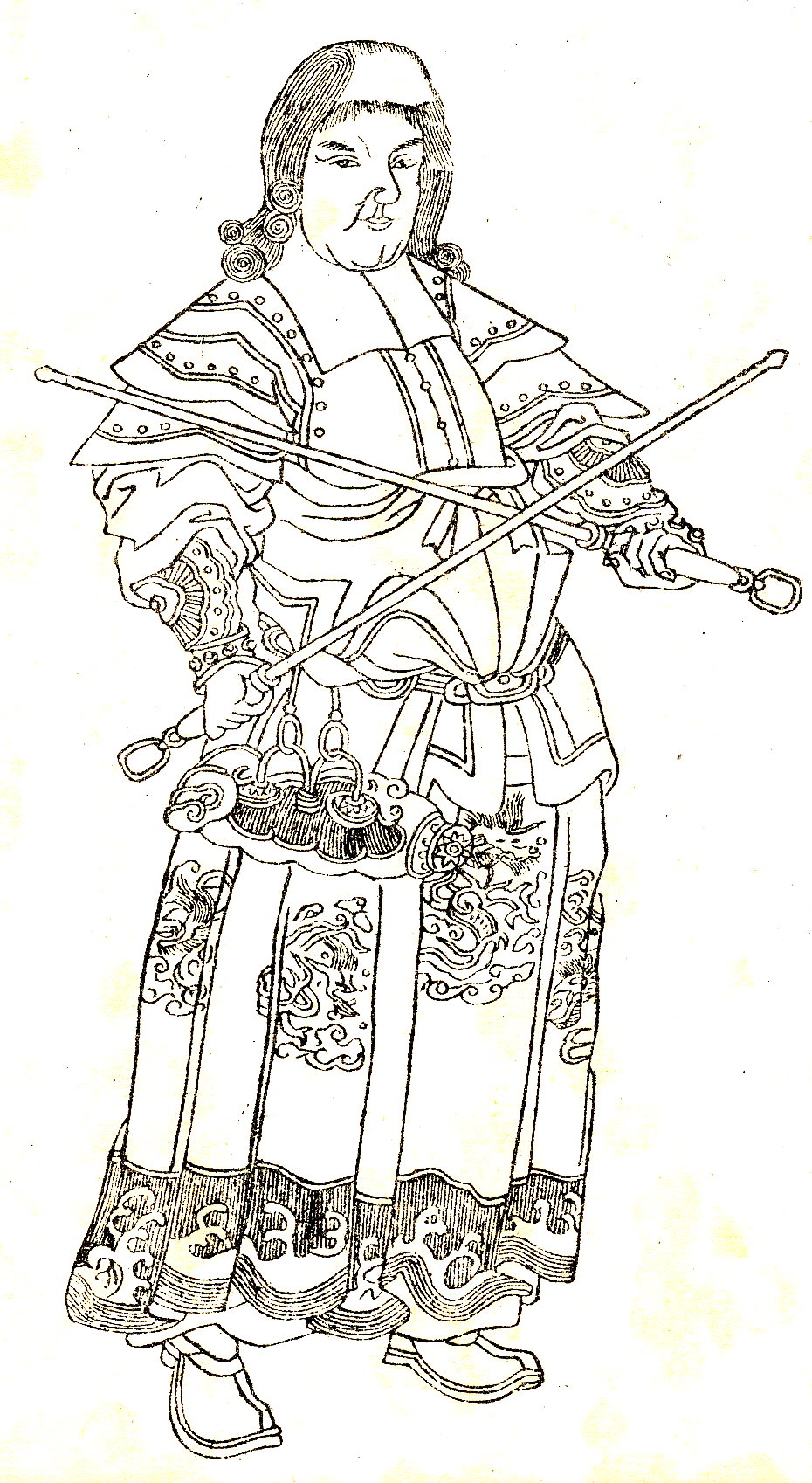|
People's Park (Nanning)
People's Park () is an urban public park in central Nanning, the capital of Guangxi Zhuang Autonomous Region in southern China. It is also known as White Dragon Park () because of the White Dragon Lake inside the park. Overview People's Park is located at 1 East Renmin Road in central Nanning, a ten-minute walk from Chaoyang Square. Its main features are the White Dragon Lake (白龙湖), with a small island connected to the shore by two bridges, and Wangxian Hill (望仙坡), the highest point in downtown Nanning. On top of the hill is the Zhenning Fort (镇宁炮台), reached by 141 ten-meter-wide () stone steps. In the middle of the park is the Shady Botanical Garden, featuring rare herbs, local flowers, and a 1,000-year-old banyan tree. In the northeast corner is a Monument to Revolutionary Martyrs, surrounded by pine and cypress trees. The park is rated an AAA tourist attraction by the China National Tourism Administration. History According to the Southern Song dynasty ge ... [...More Info...] [...Related Items...] OR: [Wikipedia] [Google] [Baidu] |
Urban Park
An urban park or metropolitan park, also known as a municipal park (North America) or a public park, public open space, or municipal gardens ( UK), is a park in cities and other incorporated places that offer recreation and green space to residents of, and visitors to, the municipality. The design, operation, and maintenance is usually done by government agencies, typically on the local level, but may occasionally be contracted out to a park conservancy, "friends of" group, or private sector company. Common features of municipal parks include playgrounds, gardens, hiking, running and fitness trails or paths, bridle paths, sports fields and courts, public restrooms, boat ramps, and/or picnic facilities, depending on the budget and natural features available. Park advocates claim that having parks near urban residents, including within a 10-minute walk, provide multiple benefits. History A park is an area of open space provided for recreational use, usually owned and maintain ... [...More Info...] [...Related Items...] OR: [Wikipedia] [Google] [Baidu] |
Zhenning Fort
Zhenning Buyei and Miao Autonomous County (; usually referred to as "Zhenning County", commonly abbreviated as Zhenning (); Buyei: Zenqninf Buxqyaix Buxyeeuz Ziqziqxianq) is an autonomous county under the administration of the prefecture-level city of Anshun, in the southwest of Guizhou Province, China. History In the 3rd century BC, Zhenning Buyei and Miao Autonomous County (Zhenning) was a part of an ancient political entity Yelang. In 233, in the 11th year of Jianxing period of Shu Han (221–263), the county under the control of Puli Dazong (). In late Song dynasty, the powerful Mongol Empire, led by Genghis Khan, began their conquest of Song Empire. The Mongolian army occupied Zhenning and it came under the jurisdiction of Hehong Zhou (). In 1351, in the 11th year of Zhizheng period of the Yuan dynasty (1271–1368), Hehong Prefecture was renamed "Zhenning Zhou" () and belonged to Puding Circuit (). In 1385, in the ruling of Hongwu Emperor of the Ming dynasty ... [...More Info...] [...Related Items...] OR: [Wikipedia] [Google] [Baidu] |
Parks In Guangxi
A park is an area of natural, semi-natural or planted space set aside for human enjoyment and recreation or for the protection of wildlife or natural habitats. Urban parks are green spaces set aside for recreation inside towns and cities. National parks and country parks are green spaces used for recreation in the countryside. State parks and provincial parks are administered by sub-national government states and agencies. Parks may consist of grassy areas, rocks, soil and trees, but may also contain buildings and other artifacts such as monuments, fountains or playground structures. Many parks have fields for playing sports such as baseball and football, and paved areas for games such as basketball. Many parks have trails for walking, biking and other activities. Some parks are built adjacent to bodies of water or watercourses and may comprise a beach or boat dock area. Urban parks often have benches for sitting and may contain picnic tables and barbecue grills. The largest ... [...More Info...] [...Related Items...] OR: [Wikipedia] [Google] [Baidu] |
Krupp
The Krupp family (see pronunciation), a prominent 400-year-old German dynasty from Essen, is notable for its production of steel, artillery, ammunition and other armaments. The family business, known as Friedrich Krupp AG (Friedrich Krupp AG Hoesch-Krupp after acquiring Hoesch AG in 1991 and lasting until 1999), was the largest company in Europe at the beginning of the 20th century, and was the premier weapons manufacturer for Germany in both world wars. Starting from the Thirty Years' War until the end of the Second World War, it produced battleships, U-boats, tanks, howitzers, guns, utilities, and hundreds of other commodities. The dynasty began in 1587 when trader Arndt Krupp moved to Essen and joined the merchants' guild. He bought and sold real estate, and became one of the city's richest men. His descendants produced small guns during the Thirty Years' War and eventually acquired fulling mills, coal mines and an iron forge. During the Napoleonic Wars, Friedrich Kr ... [...More Info...] [...Related Items...] OR: [Wikipedia] [Google] [Baidu] |
Lu Rongting
Lu Rongting (; September 9, 1859 – November 6, 1928), also spelled as Lu Yung-ting and Lu Jung-t'ing, was a late Qing/early Republican military and political leader from Wuming, Guangxi. Lu belonged to the Zhuang ethnic group.吴振汉. 《国民政府时期的地方派系意识》. 文史哲出版社. 1992. Life Late Qing Era Lu Rongting came from a peasant family and joined secret societies (Hui Dang) during his youth in order to make a living. He surrendered to the Qing army at Shuikou Pass in 1882 and joined the local chapter of the Tiandihui. He became a regular in the Qing army after the outbreak of the Sino-French War in 1884. After the end of the war, he was dismissed and he subsequently returned to banditry. His main efforts were focused on harassing the French army, which made him popular among the locals. In 1894, Lu Rongting was co-opted (zhao'an) into the army of Guangxi's Provincial military commander (广西提督) Su Yuanchun (苏元春) and receive ... [...More Info...] [...Related Items...] OR: [Wikipedia] [Google] [Baidu] |
Wang Yangming
Wang Shouren (, 26 October 1472 – 9 January 1529), courtesy name Bo'an (), art name Yangmingzi (), usually referred to as Wang Yangming (), was a Chinese calligrapher, general, philosopher, politician, and writer during the Ming dynasty. After Zhu Xi, he is commonly regarded as the most important Neo-Confucian thinker, for his interpretations of Confucianism that denied the rationalist dualism of the orthodox philosophy of Zhu Xi. Wang and Lu Xiangshan are regarded as the founders as the Lu–Wang school, or the School of the Mind. In China, Japan, and Western countries, he is known by his honorific name rather than his private name. Life and times Wang was born in Yuyao, Zhejiang Province, to a scholarly family with a tradition of bureaucratic service. His father, Wang Hua, was first (''Zhuangyuan'', 狀元) in the Imperial Examination of 1481, and rose to become the vice-minister of the Ministry of Rites, but was later demoted and subsequently expelled from gov ... [...More Info...] [...Related Items...] OR: [Wikipedia] [Google] [Baidu] |
Nong Zhigao
Nong Zhigao (modern Zhuang language: ; , vi, Nùng Trí Cao, links=no) (1025–1055?) is a hero admired by the Nùng people of Vietnam, and Zhuang people, Zhuang people of China. His father Nong Quanfu was head of the local Zhuang people in Guangyuan (廣源), Guangnan West Circuit (廣南西路) of China's Song dynasty, Song Dynasty. Summary According to the ''History of Song (Yuan dynasty), History of Song: Guangyuan Zhou Man Zhuan'' (宋史·廣源州蠻傳), Nong Zhigao followed his father, Nong Quanfu (:zh:儂全福, 儂全福), as head of the local Zhuang people in Quảng Uyên/Guangyuan (present-day Cao Bằng Province). In 1042, at the age of 17, Zhigao declared independence and established a new state, Dali (大历, not to be confused with the concurrent Dali Kingdom (大理)). For this, Zhigao was captured by Vietnamese troops and held at Hanoi, Thang Long for several years. After his release in 1048, Zhigao announced the founding of the Nantian (南天, "Southern ... [...More Info...] [...Related Items...] OR: [Wikipedia] [Google] [Baidu] |




